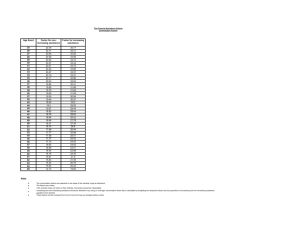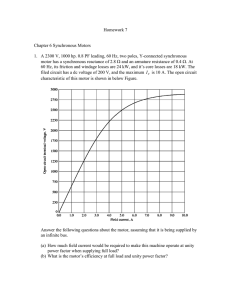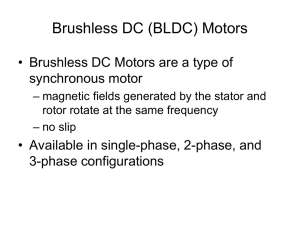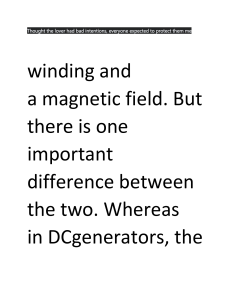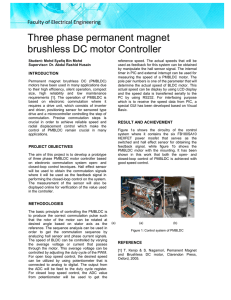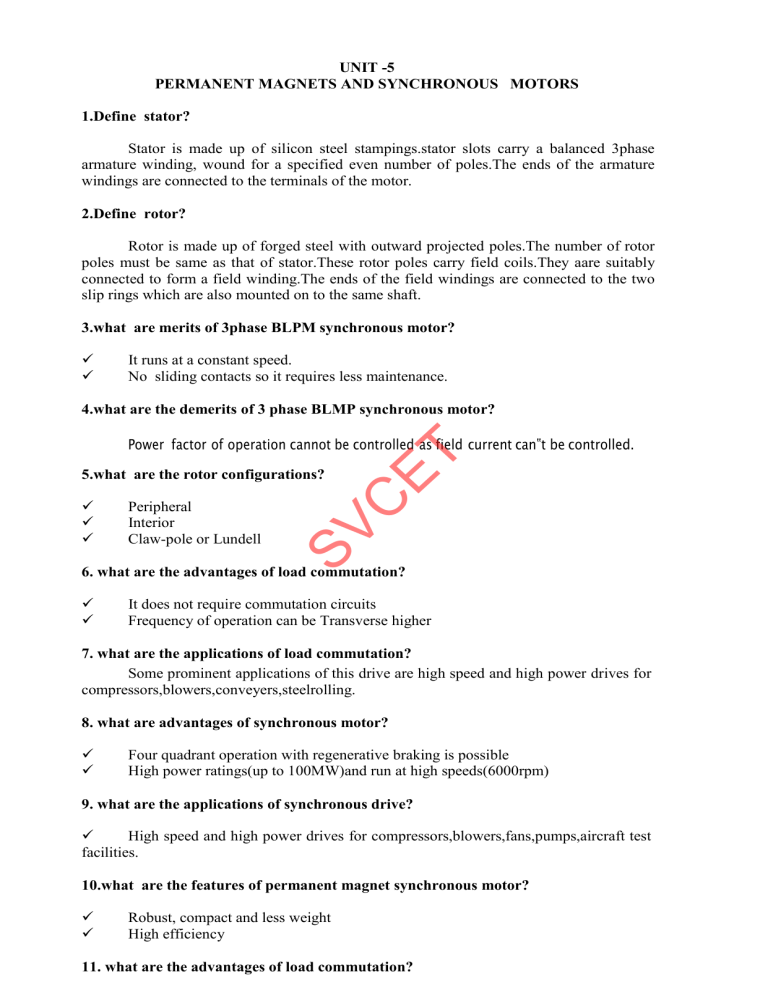
UNIT -5 PERMANENT MAGNETS AND SYNCHRONOUS MOTORS 1.Define stator? Stator is made up of silicon steel stampings.stator slots carry a balanced 3phase armature winding, wound for a specified even number of poles.The ends of the armature windings are connected to the terminals of the motor. 2.Define rotor? Rotor is made up of forged steel with outward projected poles.The number of rotor poles must be same as that of stator.These rotor poles carry field coils.They aare suitably connected to form a field winding.The ends of the field windings are connected to the two slip rings which are also mounted on to the same shaft. 3.what are merits of 3phase BLPM synchronous motor? It runs at a constant speed. No sliding contacts so it requires less maintenance. 4.what are the demerits of 3 phase BLMP synchronous motor? ET Power factor of operation cannot be controlled as field current can‟t be controlled. Peripheral Interior Claw-pole or Lundell SV C 5.what are the rotor configurations? 6. what are the advantages of load commutation? It does not require commutation circuits Frequency of operation can be Transverse higher 7. what are the applications of load commutation? Some prominent applications of this drive are high speed and high power drives for compressors,blowers,conveyers,steelrolling. 8. what are advantages of synchronous motor? Four quadrant operation with regenerative braking is possible High power ratings(up to 100MW)and run at high speeds(6000rpm) 9. what are the applications of synchronous drive? High speed and high power drives for compressors,blowers,fans,pumps,aircraft test facilities. 10.what are the features of permanent magnet synchronous motor? Robust, compact and less weight High efficiency 11. what are the advantages of load commutation? It does not require commutation circuits Frequency of operation can be higher 12. what are the applications of PMSM? Used as a direct drive traction motor Used as high speed and high power drives for compressors,blowers,conveyors 13.what are features of closed-loop speed control of load commutated inverter fed synchronous motor drive? High efficiency Four auadrant operation with regeneration braking is possible 14. what are the merits of PMSM? It runs at constant speed No field winding,no field loss,better efficiency 15.what are the demerits of PMSM? ET Power factor of operation cannot be controlled as field winding cannot be controlled It leads to losses and decreases efficiency 16.what are assumptions made in derivation of emf equation for PMSM? SV C Flux density distribution in the air gap is sinusoidal Armature winding consists of full pitched,concentrated similarly located coils of equal number of turns 17. Why PMSM operating in self controlled mode is known commutatorless dc motor? Load side controller performs some what similar function as commutator in a dc machine.The load side converter and synchronous motor combination function similar to a dc machine. First,it is fed from a dc supply and secondly like a dc machine. The stator and rotor field remain stationary with respect to each other at all speeds.Consequently,the drive consisting of load side converter and synchronous motor is known as “Commutator less dc motor”. 18.what is”pulsed mode”? For speeds below 10%of base speed,the commutation of load side converter thyristors Is done by forcing the current through the conducting thyristors to zero This is realized by making source side converter to work as inverter each time load side converter thyristors are to be turned off Since the frequency of operating of load side converter is very low compared to the source frequency.Such an operation can be realized.The operation of inverter is termed as”Pulsed mode” 19. What is load commutation? Commutation of thyristors by induced voltages of load is known as”Load commutation”.Here,frequency of operation is higher and it does not require commutation circuits. 20. What is meant bysynchronous reactance? SV C ET It is the sum of armature leakage reactance and fictitious reactance. Xs=Xt+Xa ET C SV ET C SV ET C SV
